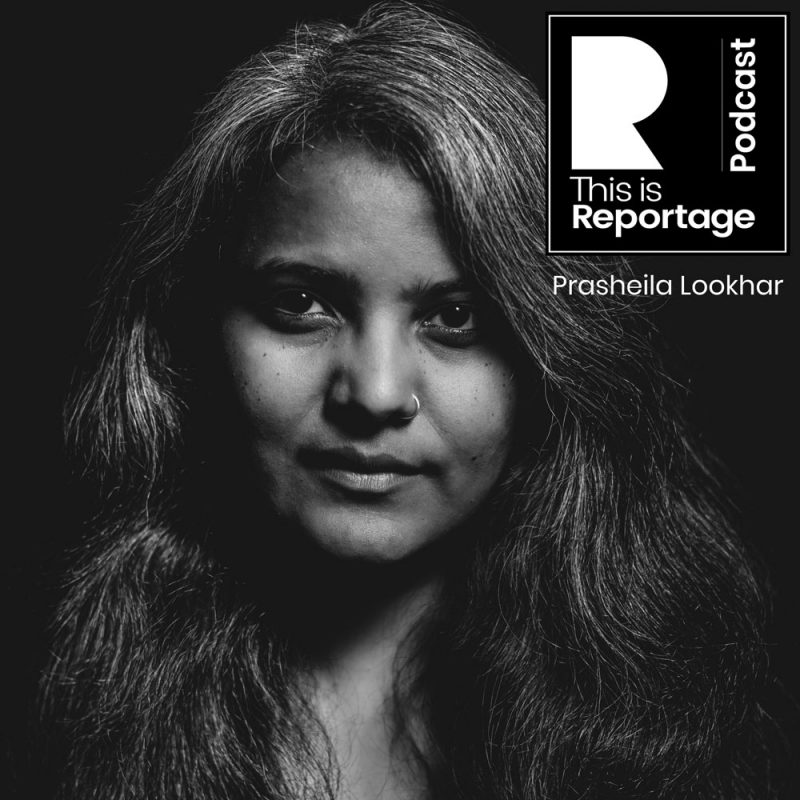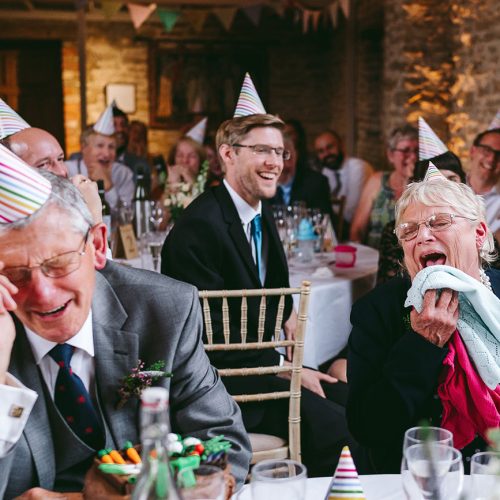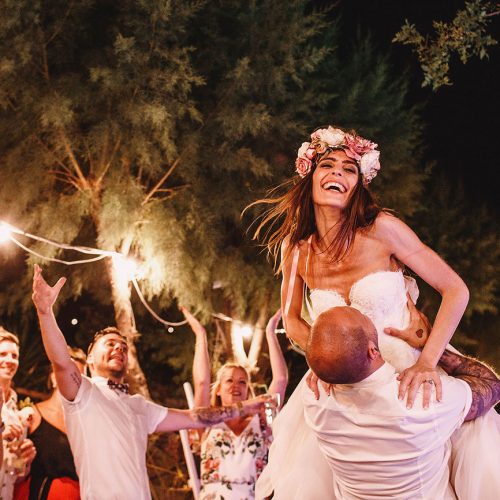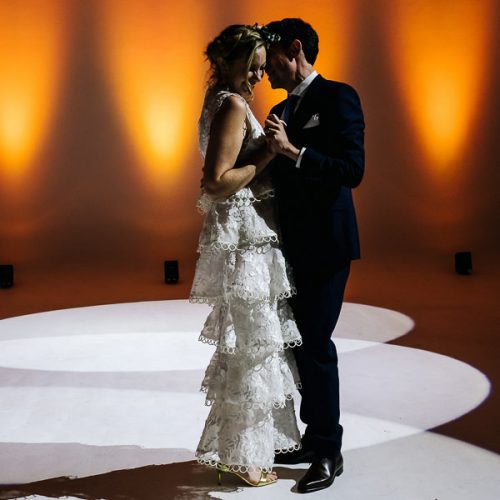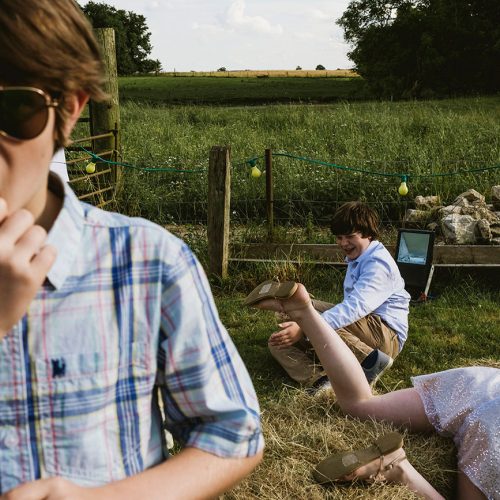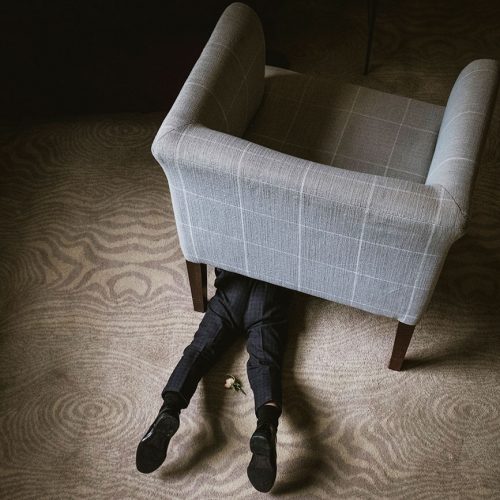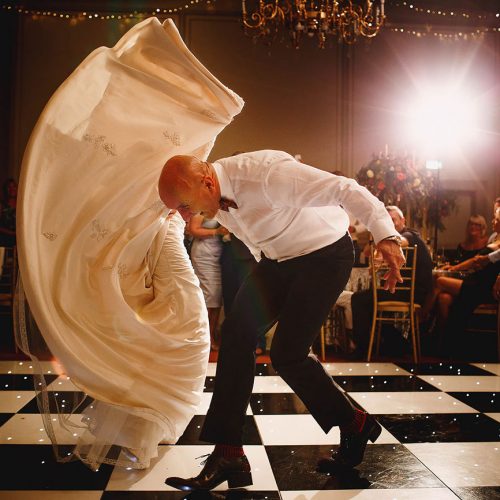Podcast Episode 41: This is Prasheila Lookhar
Delighted to be talking to the fab Prasheila Lookhar for episode 41 of the This is Reportage Podcast today! Prasheila is one half of the award-winning team Going Bananas Photography, and is one of the very best wedding photographers in India. She works together with her partner, Abhimanyu, and between them they have won a massive 15 Reportage Awards and 2 Story Awards.
Prasheila shares so much with us today, including:
- how coronavirus has been affecting her and her business in India
- her journey from working for a UN agency to wedding photographer,
- the story behind their ‘Going Bananas Photography’ business name,
- the importance of empathy,
- cutting her own pizza,
- what makes her happy,
- why she loves to capture the Haldi (where the bride and groom are covered in turmeric paste),
- shooting a wedding with 2000 guests,
- the benefits of shooting as a large team,
- advice and tips for just starting out,
- the day she would choose to live over and over again,
- defining your own success,
- something that had a large impact on her photography,
- editing tips,
- why wooden iPhone cases are so great,
- her love of reading and getting inspiration from that,
- and much more…
Listen on Spotify, iTunes/Apple Podcasts, Google Podcasts, YouTube, and below in this post:
Alan Law:
Hey Prasheila, how are you doing?
Prasheila Lookhar:
I’m good, Alan, how are you?
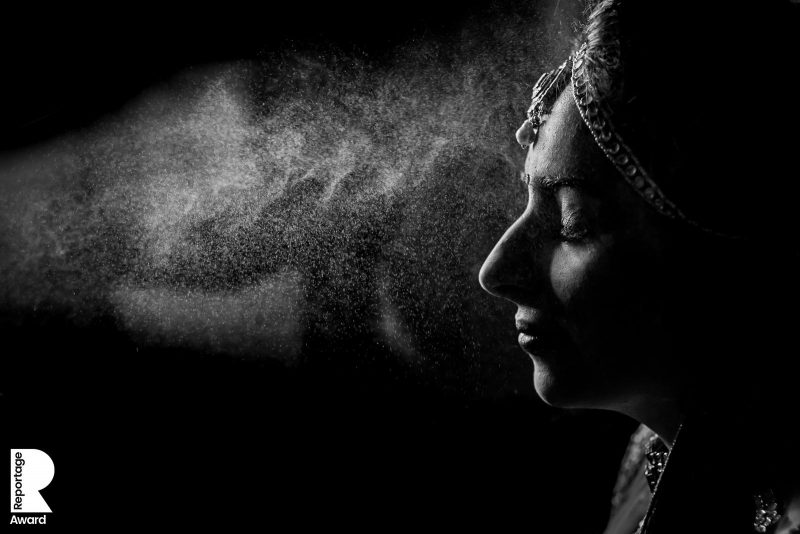
Alan Law:
Yeah. Good. Thank you. Yeah, not too bad, but in these you know, obviously mad times, how’s things with you over… cause you’re in India, aren’t you?
Prasheila Lookhar:
Yes. So it’s not that good in the country as a whole you know, we have reached number three in terms of total cases, coronavirus cases in the world. So it’s a bit of a mess. That’s all I can say.
Alan Law:
Oh yeah. Nightmare. And how has it been for you, you know, kind of wedding wise and work wise, what’s happened for you?
Prasheila Lookhar:
So for now we have actually taken a conscious decision to not take up weddings because the government has allowed people to have weddings you know, with 50 people maximum. And there are a few people who are still doing it, but with the cases increasing, you know, the way they are, we just don’t want to take a chance because you know, like most Indian kids, we actually live with our parents.
Alan Law:
Right. Sure. I totally understand that.
Prasheila Lookhar:
So we just don’t want to take a chance with their health either.
Alan Law:
Yeah. I mean, that’s the most important thing, isn’t it? So, yeah, I totally get that. And how has it been? Have you been able to postpone kind of weddings to next year and things?
Prasheila Lookhar:
Yes, fortunately, yes. Yeah.
Alan Law:
Okay that’s good. And what have you been doing then? We’re not shooting any weddings. How have you been dealing with this time?
Prasheila Lookhar:
Oh, actually we still had a bit of post-production from the weddings we shot before the lockdown had been announced in India. So we are just, you know, getting those deliveries out. So it’s actually been pretty busy. We haven’t, I think maybe once all the deliveries go out, then there’ll be like a certain, you know, there’ll be a lull of activity, but I’m sure there’ll be lots to do because I mean, in a business you always just have lots to do. Right?
Alan Law:
So true. Isn’t it? Yeah. It’s so true. And this time in general, I guess, obviously it’s been really, really difficult and, you know, I don’t know about you when I realized how impactful it was going to be at the beginning. It was, it was really quite shocking and scary.
Prasheila Lookhar:
It still is right? I mean, I read some news about a new strain being found in China, which is apparently deadlier than COVID-19.
Alan Law:
Really?
Prasheila Lookhar:
Yeah, yeah. It was in the news, I think last week or early this week.
Alan Law:
Honestly, I try to keep away from a lot of the news. It’s just a lot of it is just so scary; ignorance can be a bit bliss. Let’s change subject.
Prasheila Lookhar:
Let’s not talk about coronavirus anymore.
Alan Law:
I agree. Cool. So let’s go, let’s go right to your kind of beginning. So how did you become a wedding photographer? You know, what was your journey? How did you get into this?
Prasheila Lookhar:
So I’ve been into photography for, I think now 20 years. My dad had got me, my dad was in the merchant Navy, so he would always, you know, get us cool gifts once when he would be back home. So one of the things that he’d actually got me was a camera and I would just keep experimenting. I had no idea about composition. I did not really understand anything technically about it, but I would just, you know, take photos and just get those rolls developed. And I think that’s where the interest just started and, you know, got my first SLR and just was shooting just for fun. And I quit my job because I realized that I wanted to do something more in life and did want to take up photography seriously.
Alan Law:
What were you doing before you quit your job, then? What was your job?
Prasheila Lookhar:
I was handling communications for a UN agency in India.
Alan Law:
Oh, wow. Right. Cool. I bet that’s stressful? Sounds stressful.
Prasheila Lookhar:
It was fun actually. It was a lot of fun. There were, I think the kind of experiences that you get in a role like that, you wouldn’t be able to get in any other role. I was doing documentation trips to far-flung villages, you know, to understand how the impact of the programs that the agency had at the grassroots level. And that’s not something you do otherwise in day to day life.
Alan Law:
That’s true. Isn’t it? Yeah. That must be really interesting.
Prasheila Lookhar:
It was. It was a lot of fun, but you know, at the end of it, photography sort of won out.
Alan Law:
Right. That’s cool. Yeah. So you quit your job and then what happened then, then?
Prasheila Lookhar:
So for a while, actually I did not really know what I wanted to do and I actually shot something called in I don’t know if they still have it, it’s called the hockey India league. And we had people, you know, there were teams coming in from all over the world for it. And I was shooting the Delhi matches and the VIP lounge. And that was fun. You know, I think I did six, I think there were six matches in Delhi that year.
Alan Law:
How did you get into that? Are you into hockey then?
Prasheila Lookhar:
No, it just happened. It’s just one of those things that just happened. And then later actually one of our closest friends, his brother, his elder brother was getting married. So we just decided that, you know what, let’s just give it a shot. They already had a photographer. So there was no pressure on us to, you know, give them all the photos. We were just there to have fun and we shot that wedding and we realized how much we actually not, I mean, I have always loved weddings. Like I think weddings, especially in India, they are so amazing. They’re colourful. They’re emotional, there’s always so much to do. So I absolutely love Indian weddings.
Alan Law:
Oh that’s cool. Had you been to many weddings then before you photograph that one?
Prasheila Lookhar:
Oh yeah, of course. I had 50 first-cousins and I’m not exaggerating.
Alan Law:
Oh, okay. Wow.
Prasheila Lookhar:
So yeah.
Alan Law:
What year was that first wedding that you shot? What year was that?
Prasheila Lookhar:
2013? I think it was like 2012. Okay. I’m not sure about that but it was in 2012 or 13. Yeah.
Alan Law:
That’s around the same time. Yeah. 2012, 13 when I began as well actually. And you were saying ‘we’ then, so did you shoot that together with your partner who are you in business with now?
Prasheila Lookhar:
Yes. Abhimanyu and I shot that together.
Alan Law:
That’s cool.
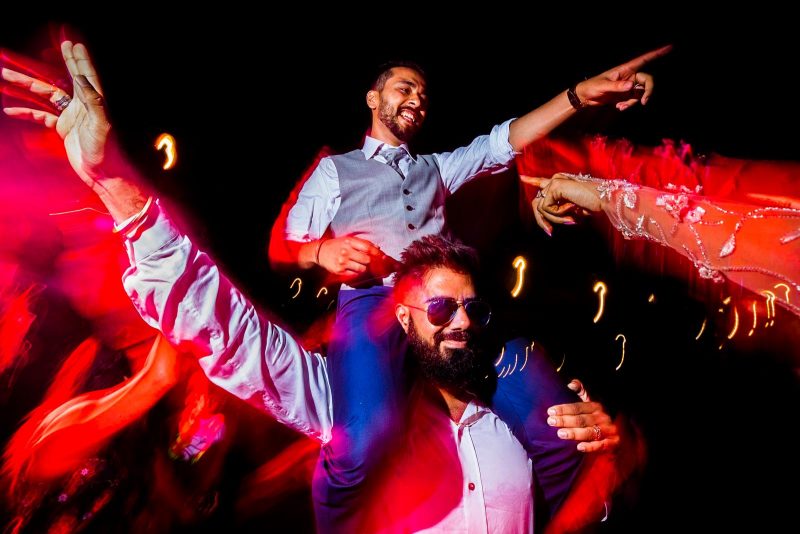
Prasheila Lookhar:
And yeah, and we just shot that wedding. We realized how much we really had, we had so much fun doing that, you know, so we just decided, okay, you know what? Let’s do this and well, that’s that.
Alan Law:
Oh, that’s cool. Yeah. And then we’re here now and obviously you’re doing so well. It’s brilliant work. Yeah. It’s so good.
Prasheila Lookhar:
Yeah.
Alan Law:
And so then how did I know you must get this question a lot of the time, but how did you get the name then of Going Bananas Photography?
Prasheila Lookhar:
It’s an interesting story. There are two different versions. Both of them are true. So, you know, when we decided to quit our jobs and we decided to do this, you know, a lot of our family was like, okay, you know what? You guys are like gone nuts. And I think somebody just said that you’re going bananas. And we were like, well, oh yes, we are going bananas. So, you know, that sounds like a good name. Yeah. And you know, around that same time, one of my friends had sent me a forward about the benefits of bananas. I know that sounds ridiculous, but that is actually how we just decided to go with the name.
Alan Law:
That’s a great story. I love that. Oh, that’s great. Oh, it’s a cool name though, as well. Isn’t it? It’s different. It’s unique. And it’s got so much personality in it. So many business names can be, you know, like mine, Alan law, just my name. It’s boring. It’s so boring. I think it’s great you’ve got that name.
Prasheila Lookhar:
We might decide to change it.
Alan Law:
Oh really?
Prasheila Lookhar:
So, yeah. Yeah, because our work actually. I mean, I think going bananas is a very good representation of us, but it’s not a very good representation of a business because a lot of our work is photojournalistic. Right. And you know, it’s so emotional, so the photos are quite intense. So the name does not go with those photos and that all that work. So we have been contemplating changing it. Let’s see. We’re still in talks.
Alan Law:
Oh, okay. Well, that’s interesting though. Yeah. And I get where you’re coming from there as well. No, that’s yeah. That’s interesting. There’s one line from your bio where you say ‘Prasheila is one half of the award winning, Going bananas photography team – the sane half.’ I like that.
Prasheila Lookhar:
Yeah. Yeah. It’s I think we had a lot of fun just writing that out too. Yeah.
Alan Law:
Yeah. It’s a great, I had another one, another line from that bio, which I found interesting. It says ‘she is often described as a bridesmaid by her brides rather than a photographer’, which is cool. Can you tell us about that? Are you very hands on on the day then?
Prasheila Lookhar:
I actually am, a lot of times, and I do get a lot of flak from it from the team because I stop taking photos to essentially help the bride or the family with something. So, but it’s always like, I do believe I am empathetic. What is the right word?
Alan Law:
I know. I always get confused, but I think empathetic is right rather than empathic.
Prasheila Lookhar:
Empathetic. Right.
Alan Law:
I used to use both I think. Yeah. I know. Yeah I think empathetic.
Prasheila Lookhar:
I’m not sure though. So let’s go with empathetic. Oh my God. And now suddenly I can’t say it.
Alan Law:
Empathetic sounds good.
Prasheila Lookhar:
Empathetic. Yes. I think I am. I mean, obviously I’m not the right person to say, you know, I think other people would know better. But it’s very easy for me to tune into what a bride is feeling on the day of. So a lot of times, you know, I have asked friends to not meet her because she’s just so emotional and she just needs those two minutes to just settle down, you know? And it’s just a lot of these things, and it’s actually something that I don’t do consciously. I think it’s more about just the kind of person I am, yeah. This is actually one of our brides, a few of our brides actually, when they write out testimonials for us, they did say this and that is when we realize that, Oh, this is what I am actually doing. So I never really realized it myself.
Alan Law:
It’s just who you are, which is great. I think. Yeah and that’s really lovely. And I bet that everybody really appreciates that and yeah, it’s awesome. You know, sometimes I often get asked just in groom prep, like which side does the flower go? And I never know, even though I’ve shot like 300 weddings, I still don’t know. I’m like, okay, I know now, but is it my left? Like looking at them or their left looking at me.
Prasheila Lookhar:
Their left.
Alan Law:
Okay. I know I need you there with me every wedding.
Prasheila Lookhar:
Next time I’m there let’s make it happen.
Alan Law:
Yeah. That would be fun. Wouldn’t it? That would be fun. Oh, so yeah.
Prasheila Lookhar:
Whenever that is.
Alan Law:
I know. Yeah, I wonder when that will be. So I was lucky enough I met you. It was last, was it last summer?
Prasheila Lookhar:
It was just in August.
Alan Law:
And it was a nice day in Truro in Cornwall.
Prasheila Lookhar:
It was. I’m so glad I did that trip to Cornwall. It was so much fun.
Alan Law:
Well, it’s cool. It’s lovely down here. I’m lucky. It was lovely meeting you. I mean, we had pizza that you had to slice yourself.
Prasheila Lookhar:
Oh, it was so strange because in India I have never had to cut my own pizza ever. And even when I told a few of my friends, they were like, what? Who sells pizza like that?
Alan Law:
It’s funny, isn’t it? Yeah. I don’t know why they don’t slice it.
Prasheila Lookhar:
Yeah. But you know, I was trying to remember after that because we have been to Italy. Right? And I don’t remember if a pizza was sliced or whether we had to cut it or the server who was also a, you know, from somewhere in the Indian subcontinent, maybe he just realized that, okay, these people are Indian. They won’t be able to cut their own pizza. Maybe I’ll just slice it and give it to them.
Alan Law:
That’s funny. That’s funny. Oh, that’s funny. Cool. I have not been back there since like, Oh no. Maybe once. Yes. Because I did think of you the next time I was there having that pizza.
Prasheila Lookhar:
Yeah. It’s really good pizza.
Alan Law:
Oh, it’s good pizza. Wasn’t it? Yeah. That was Pierro’s in Truro. I have a little plug for them. I’m sure they’re not listening, but yeah. I knew you very kindly gave me that book, which I thought was so great and really inspirational.
Prasheila Lookhar:
Yeah, it’s such a wonderful book. Isn’t it?
Alan Law:
‘The last lecture’. And then I use that as inspiration for me. I did when I spoke at elevate conference just after that. And I did a kind of little mini last lecture with my kind of just thoughts on life. So you really inspired me.
Prasheila Lookhar:
I must have, like, I’m not exaggerating. I think I’ve given out like over a hundred copies of that book as gifts.
Alan Law:
That’s so cool. That’s such a lovely idea. Because yeah, it was, it was brilliant. And Oni read it, too, my wife and yeah. She found it really inspirational, so yeah. Thank you. Anyway. That was great.
Prasheila Lookhar:
I hope you know what book I’m giving you next time we meet.
Alan Law:
Oh, okay, cool. I look forward to that. I look forward to that. Cool. Let’s change Tack. Let’s change tack Prasheila. What’s the first thing that comes to your mind when I ask what makes you happy?
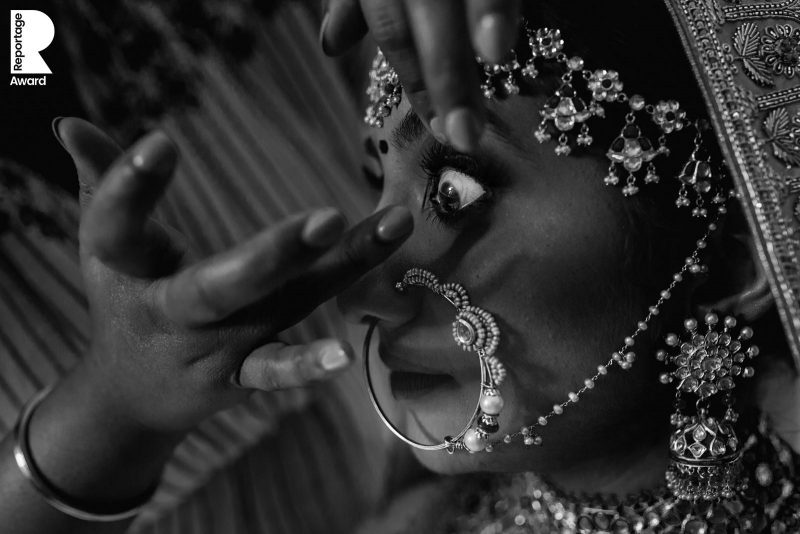
Prasheila Lookhar:
Spending time with my niece.
Alan Law:
Oh really? Oh, that’s cool. How old is your niece?
Prasheila Lookhar:
She will turn nine in November. So she’s eight, a little over eight and a half.
Alan Law:
Virtually the exact same as my daughter will be nine in January. So very similar. It’s a lovely age. Isn’t it?
Prasheila Lookhar:
It really is. You know, she started reading and you know, and she keeps telling me all the things that she’s reading and it’s just so wonderful. I love spending time with her.
Alan Law:
Oh, that’s cool. Does she live near you or?
Prasheila Lookhar:
No. No, she does not. And they will be moving to the UK soon. Yeah. They were actually supposed to go this year, but didn’t happen.
Alan Law:
No, I can understand why as well. Yeah.
Prasheila Lookhar:
Yeah. Let’s not go there again.
Alan Law:
Cool. Let’s go back to you. What were you like at school? You know, did you enjoy it? Were you always into like creating things and, you know, did you ever, were you into photography at school?
Prasheila Lookhar:
No, I was not creative at all I think at school. At all. Yeah. I was very focused on my studies. I was not into any sport of any kind, which I now regret. But yeah, I was actually quite a boring person in school, I would say.
Alan Law:
No, I’m sure that’s not true.
Prasheila Lookhar:
I think it is. Yeah, you can. I think you should ask my friends. They’ll say the same thing.
Alan Law:
Oh, did you enjoy school though? Are you, did you know, or were you someone who didn’t really, not that keen on attending? Did you enjoy it?
Prasheila Lookhar:
Yeah, I think I did actually neutral. It was just something that, you know, you’re supposed to do. So I don’t think I ever saw it as something to enjoy.
Alan Law:
Okay. That’s interesting. Did you have a dream when you were at school or like what you wanted to do, you know, career wise, but you never thought about being a wedding photographer?
Prasheila Lookhar:
Oh, for sure, I did not. I think I wanted to become at one point I wanted to become an IAS officer, which is the administrative, these are officers who go into government administration. Okay. Yeah, so civil services and at one point I wanted to become a surgeon. Oh, wow. Cool. Yeah. But definitely no. I don’t think I would have ever thought that I would be a wedding photographer.
Alan Law:
No, I guess same with me. So it’s funny. Isn’t it? How our lives?
Prasheila Lookhar:
What did you want to be?
Alan Law:
Oh, I wanted to be an author for a while. Yeah. And then I wanted to be a barrister. I’ve got the surname for it, you know, Law.
Prasheila Lookhar:
Yes you do.
Alan Law:
But I wanted to be a barrister for quite a while, but then I watched the film. Have you ever seen a film with Harrison Ford in it called Regarding Henry?
Prasheila Lookhar:
I have not.
Alan Law:
Okay. Well, he’s a barrister in that and he’s a horrible person. Then he has, he gets attacked. He gets attacked, but, and then, and, and it’s horrible, but then he becomes a much nicer person after this kind of attack and stuff. And that put me off wanting to be a barrister. Kind of a silly reason, I guess. But anyway, anyway. Yeah, that’s it. Yeah. Prasheila, which part of a wedding do you enjoy capturing the most?
Prasheila Lookhar:
Well, you know, right? At an Indian wedding, there are just so many things. I would say the Haldi, I think Haldi ceremonies are so much fun, so much fun.
Alan Law:
What happens in that ceremony?
Prasheila Lookhar:
The relatives apply turmeric paste on the bride and the groom, traditionally the bride and the groom have it at different places. But nowadays, a lot of bride and grooms have it together. Right. So yeah, it’s just a lot of fun, you know, they’re just so much laughter and so much emotion and you know, there’s always somebody who ends up crying in one corner.
Alan Law:
Oh really? Yeah.
Prasheila Lookhar:
Yeah. It’s so much fun. The Haldi is so much fun. I really enjoy shooting that. The actual wedding itself too, you know, there’s this part at Indian weddings where the priest will explain the vows that the couple has actually taken because the ceremony is actually conducted in Sanskrit and nobody obviously speaks Sanskrit. So, and he’s translating it and you know, some of them are actually, I think they should just update it for modern times because some of them actually pretty ridiculous. But they do get a lot of laughs out of everyone.
Alan Law:
Oh really? Okay, cool.
Prasheila Lookhar:
Yeah. So those are a lot of fun.
Alan Law:
That’s cool. That’s cool. Are mostly weddings that you capture, are they kind of multi-day affairs, Most of them?
Prasheila Lookhar:
All of them.
Alan Law:
All of them. Wow. Yeah. So how many days normally, like more than two or?
Prasheila Lookhar:
I think the average is three. Yes. Average is three days.
Alan Law:
Gosh, that’s mad.
Prasheila Lookhar:
Yeah. Intense. Indian weddings are intense.
Alan Law:
Yeah. I’ve only done one. I’ve ever done one and I loved it. But it was only a one day thing as well. So yeah, I don’t think I’ve experienced one properly obviously like you do. So when they’re like three days are they three consecutive days or are they spread out over a week or so?
Prasheila Lookhar:
Oh, three consecutive days. Always.
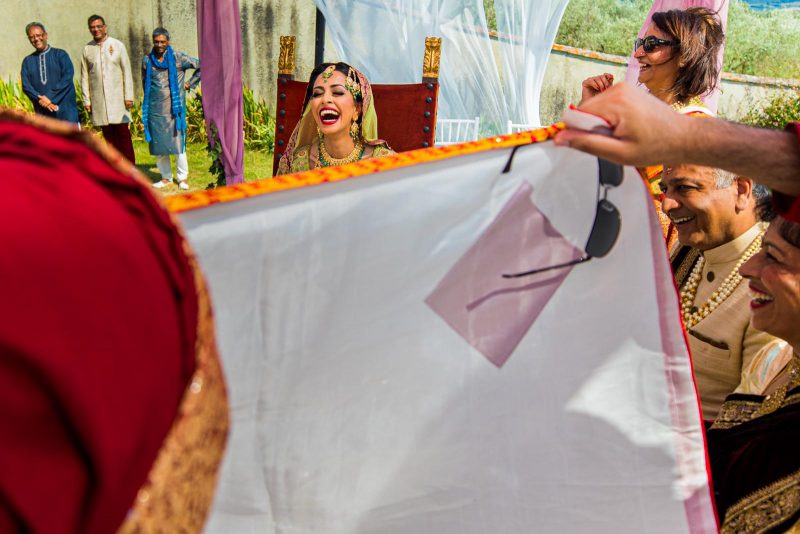
Alan Law:
Wow, Sorry. No, sorry. Yeah. It just sounds really intense. It sounds like such hard work.
Prasheila Lookhar:
It is. It is, you know, a lot of times I do come back with swollen ankles.
Alan Law:
Okay. Wow. Yeah. On your feet so long. Gosh
Prasheila Lookhar:
Yeah, yeah, yeah. Comfortable shoes. If anybody listening, they want to know the biggest, the most helpful tip for shooting Indian weddings is comfortable shoes.
Alan Law:
That is a good tip actually.
Prasheila Lookhar:
It is so important because Indian weddings, you know, the smallest Indian wedding that we’ve covered was actually in Florence. And that was 110 people, but they were couples who the bride and the groom were born in the UK. So, but in India, I think the smallest wedding we’ve covered is 300 people.
Alan Law:
Wow. That’s amazing. That is amazing. Honestly, I think that’s lot. The largest I’ve ever done was 250 and that was a one off. So, wow. What’s the largest that you’ve done?
Prasheila Lookhar:
I think it was like 2000 or 3000 people.
Alan Law:
No way.
Prasheila Lookhar:
Yeah. It was a really large wedding. And they had like different teams doing different things. So yeah.
Alan Law:
Did you do one big group shot of the 2000 people?
Prasheila Lookhar:
Oh no that’s not possible.
Alan Law:
You’d have to go backwards like on to a mountain.
Prasheila Lookhar:
A lot of times, people like these 2000, 3000 people, they’re just people who come, they meet the parents. They give gifts for the Bride and Groom. Usually money.
Alan Law:
Wow that’s a lot of money to receive.
Prasheila Lookhar:
It is, it really is. And you know, they might meet the bride and groom, they might not, and they would probably eat, you know, see if they know anyone and then they would just leave. So, but you have to make sure you know, that you are aware. So a lot of times, you know, we need to dedicate the team accordingly as well, depending, you know how large the wedding is because in India, the focus is never just on the bride and groom. It’s it has to be on the families. And you know, the parents will always expect that there is at least one photo of every guest. So a lot of group photos happen.
Alan Law:
Yeah. And when you mentioned then about having a team. So is that you and Abhimanyu, sorry is that the right pronunciation?
Prasheila Lookhar:
Yeah it is.
Alan Law:
Okay. Okay. That’s good. So both of you shooting and then do you often have like more shooters as well?
Prasheila Lookhar:
Yeah. Yeah. We have like a much larger team. We will have somebody doing, we’ll have, I think three people. Typically we have three people doing video, one person on the drone. We have two, what we call traditional photographers whose only job is to go around, making sure that everybody who is at the wedding gets a group photo.
Alan Law:
Okay. Yeah that makes sense.
Prasheila Lookhar:
So as you know, Abhimanyu and I are focused on just covering the bride and groom and you know, the really the story of the day, rather than documenting who was there and who wasn’t.
Alan Law:
Oh, that’s cool. That’s so makes sense to have some other photographers to do that kind of just, yeah, the single shots of the people, and then you two can focus on that. That’s cool. I just find it so interesting. You know, it’s really, really interesting. And how was that wedding in Florence? Just ‘cause I’ve never shot a wedding in Italy.
Prasheila Lookhar:
It was, it was beautiful. You know, it was at a Villa right outside of Florence. I think it’s called, the village is called Grazina or something. Yeah, I don’t remember. But it was, it was a beautiful wedding, you know, it was in the vineyards and such a beautiful property. It was really small. They also had two ceremonies. They did a civil ceremony and the next day they did a Hindu wedding. So it was a lot of fun. It was so much fun.
Alan Law:
Do you enjoy doing you know, destination weddings in general?
Prasheila Lookhar:
Yeah, yeah, yeah, yeah. We have a lot of fun because you know that everybody’s just going to relax and a lot of people are just going to have so much fun.
Alan Law:
That’s true. That’s true. Have you ever shot one over here in England?
Prasheila Lookhar:
No, I have not.
Alan Law:
Right. Let’s do that sometime.
Prasheila Lookhar:
Yeah that would be fun.
Alan Law:
We do a swap, although I don’t think I’d be able to cope with like 500 guests.
Prasheila Lookhar:
You come we’ll, you know, we’ll assign you to one of the parents.
Alan Law:
Awesome. Cool. What would…
Prasheila Lookhar:
Sorry, I can totally imagine you, you know, trying to communicate with people and they might not understand your accent and you’re trying to get them, you know, to do a group shot that way. That’ll be something to see.
Alan Law:
I’m sure it would be a life experience. What would be, Prasheila? What would be your top tips for people just starting out in our industry? Because obviously people that listen to this podcast, there’s a range of experience. You know, some people have been doing it a while, some people are just starting out. Would you have any advice for people who are just, you know, right at the beginning of the kind of photography career?
Prasheila Lookhar:
Yeah. I think the most important thing to remember is that you need to be organized. Because at the end of the day, it is a business and there are certain decisions that you need to take as a business rather than as a photographer. You need to make sure you’re organized. You need to know how you’re going to do data backups on the day and you know, later on as well. You need to have a clear contract, always, always have a super clear contract. You should know what the couple expects from you and the couple also should know what to expect from you. A clear communication with the couples as to what the deliverables are. Always. It might be difficult for the first few times, but you need to make sure that you give timelines to the couple. You need to under promise and over deliver, right? So if you, if you think you’ll be able to do the wedding photos, edit all the wedding photos and upload them send them in, say a month, always tell the couple two months. You should always keep that backup in mind, I think because you know, a couple will be happy if you give it to them on the 29th day, but a couple is never going to be happy if you give it to them on the 31st.
Alan Law:
That’s true. Yeah. Yeah. That’s true. That’s really good advice. I think, because that business side is so important and it’s something that a lot of people just don’t think about when they’re getting into this. So they’re just saying I can, you know, it’s just all about taking a few good photos, but it really isn’t just about that, Is it?
Prasheila Lookhar:
Yeah. It’s so much more, right? Because at the end of it, photography becomes such a small part of it. You know, there is so much more. As a business there’s so much more and you know, for photography, what I would say is that just keep experimenting, you know, just try different things. Don’t, you know, this is something that Abhimanyu and I say all the time, don’t try to focus. Especially when you’re starting out, don’t try to focus on developing a style for yourself, just experiment with different things, try new things. And you know, eventually you will reach that. You’ll be able to figure out what it is that you like to do and what you don’t. But unless you don’t try different things, you will, you’ll just be in a constant search for style when, you know, maybe what you’re trying to do at that moment isn’t what you actually would do. Okay. Wait, I think I’ve just made it so wordy and it’s…
Alan Law:
‘Made it so wordy’, no, you know what you said There was so good. That is so true. You do need to try different things. Don’t you? That’s so true. I think honestly, that’s great advice. I just love the way you said that.
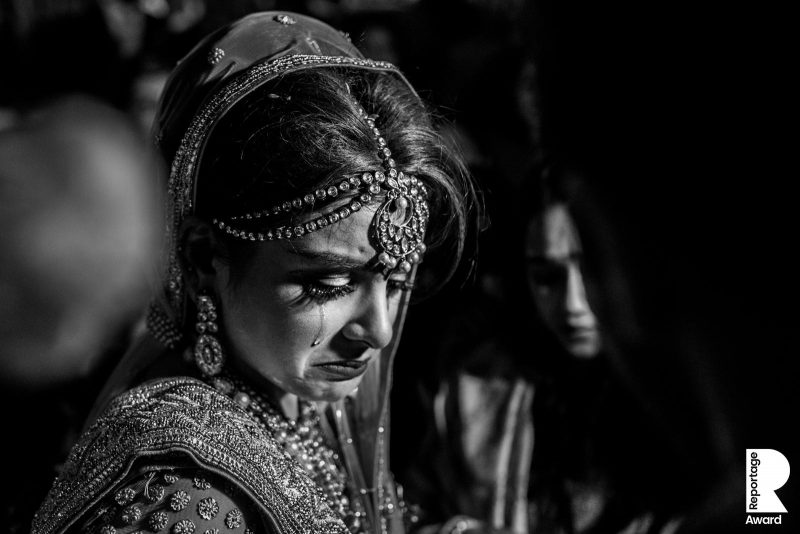
Prasheila Lookhar:
I sort of lost track somewhere there.
Alan Law:
No, that’s super good advice. That is. That’s really, really good. Thank you. I think it’s so cool. I really hope people are listening cause I just think, you know, you’re sharing so much. People can learn so much. I think it’s great. I love this quote from you by the way, which I find inspiring. So you said ‘I take inspiration from every single person I meet. Everybody has done/will do something in their life that will inspire me. You just have to look for it. Sometimes it is obvious sometimes not so much, but it is always there,’ which I think is lovely. Can you tell us a bit more about that?
Prasheila Lookhar:
So it’s actually really interesting because this is such an integral thought for me and I realized that, you know, a lot of times we don’t know other people’s stories. They might be really good friends as well, but you don’t necessarily know their life story. Right? And when you really start talking to people, there is so much there, you know, somebody who might have lived a really super simple life might actually have gone through so much in order to be able to live that simple life. And till the time you don’t really, you know, observe, see, ask questions even, you’re not going to learn about it. It’s easy to see what people are showing you. Right. And sometimes the inspiration is like, and I’m not just talking photography inspiration here. I’m talking about inspiration in life in general. There’s just so much, there’s so many people in your life that you really don’t know what they have actually gone through.
Alan Law:
Hmm, I think that’s honestly lovely. And I think you get that interest in people is yeah, it’s beautiful. And that’s what life is about, I think. And I think maybe that comes across in, you know, your empathy in your wedding work as well, your interest in people, wanting to know how they’re feeling or feeling how they’re feeling and their story. Yeah. Lovely. Very lovely. It’s great.
Prasheila Lookhar:
Thank you.
Alan Law:
If you could choose, if you could choose one day in your life to live over and over again, you know, like Groundhog Day, have you seen Groundhog Day?
Prasheila Lookhar:
I have, I have, yes.
Alan Law:
If you could choose the day that you lived over and over again, which day would it be?
Prasheila Lookhar:
Oh, wow. Interesting. That is an interesting question. I’ve actually never thought about that. I mean, I can think of several days that I would not want to relive.
Alan Law:
No, let’s go positive. Let’s go positive.
Prasheila Lookhar:
Yeah. I was thinking like maybe the day my niece was born, but then I realized that you I have so much fun with her now that you know, it’s all right. I would probably, you know, live those days. Oh, you know what? I got a good one. Yeah, last year I had taken the entire family to the Harry Potter studio, the studio tour in Oh my God. I’ve forgotten the name of the place near London. Right. It’s right outside of London. And it was beautiful, we had so much fun. I think that day for sure. Yeah, for sure. I can relive that day over and over. Yeah.
Alan Law:
Oh that’s cool. Great, cool. I wish I could make it a lot. I don’t know if I’d want to make that happen for you. Do you imagine it would be lovely? Wouldn’t it living like a great day over and over again, but it would be strange as well. It would be
Prasheila Lookhar:
Enjoy it so much if you’re doing it every day though. Right?
Alan Law:
That’s true. Isn’t it? Yeah. It’s actually something that I was thinking about the other day with Corona. You know, and people say variety’s the spice of life and it so is because in these times now it can be, you know, a lot of people are just doing the same thing over and over again, and it can be. It’s a funny thing, isn’t it? It is.
Prasheila Lookhar:
Yeah. Yeah.
Alan Law:
Wait, we’re not going to go corona again. We’re changing.
Prasheila Lookhar:
Yes, I know it keeps coming back in.
Alan Law:
I like this question. I do ask this quite often, but I like it. I think it’s very interesting. What does it mean to be successful to you? You know, what is success to you?
Prasheila Lookhar:
I think I’m still finding out. I don’t think I have defined success for myself yet.
Alan Law:
Okay. Hmm. That’s interesting.
Prasheila Lookhar:
I don’t think I know. I mean, you know, one of the things that we spoke about in our talk, I think it was last week or last week at the conference I was telling you about was that, you know, define success for yourself. That was one of the tips that we gave people that you need to define success for yourself because that’s when you know what your true North is. Right. But I think I really don’t know how I define success. Though actually, you know, I think I do now. I think for me, it’s just important that whatever I do gives me the time just to, I need to be able to spend time with my family. There have been times when I’ve actually missed my niece’s birthday for shoots and yeah. And that’s not a place where I want to be for sure. Yeah. I think success for me is being able to spend quality time with people who are important to me.
Alan Law:
Yeah and I think I totally agree. I think that’s so lovely. I’ve been so busy these past months in lock down and yeah, it does make me think that, I mean, what I’m so busy all the time and then I’m not seeing you know my family that much at all. It makes me think as well. It’s funny.
Prasheila Lookhar:
I think one of the things that has happened in the last few months is that because people aren’t so busy you know, because well now in India offices have opened up and you know, a lot of things have just started. But we were connecting people. We’re connecting like with friends, maybe who you haven’t spoken to in months and suddenly people are like, Oh, Hey, what’s up? How are you doing? So I guess that was kind of nice.
Alan Law:
Yeah. There have been some pluses. There have. But yeah, lots of negatives about it. We’re back there again. That was your fault.
Prasheila Lookhar:
It was. Sorry.
Alan Law:
Right. I get it. I’m going to ask this question because I think whenever I ask this question, people always don’t really know what to say, so I’m just going to do it again. It always kind of fails, but let’s try again. What’s something that you really love, but that most people seem to hate?
Prasheila Lookhar:
Oh, that is an interesting question.
Alan Law:
Yeah, I think it’s difficult to think or, because I say you can spin it the other way round. Like what’s something that you hate that most people seem to love if that’s easier.
Prasheila Lookhar:
No, I don’t think that would be. I do know that most people do not hate reading, so that’s not it.
Alan Law:
I’m trying to think for me. I don’t know.
Prasheila Lookhar:
No, I don’t think I can come up with anything at the moment.
Alan Law:
No, no. Okay. That question always fails. I think I’ve got to drop it from my question bank. Okay.
Prasheila Lookhar:
Has nobody been able to answer it yet?
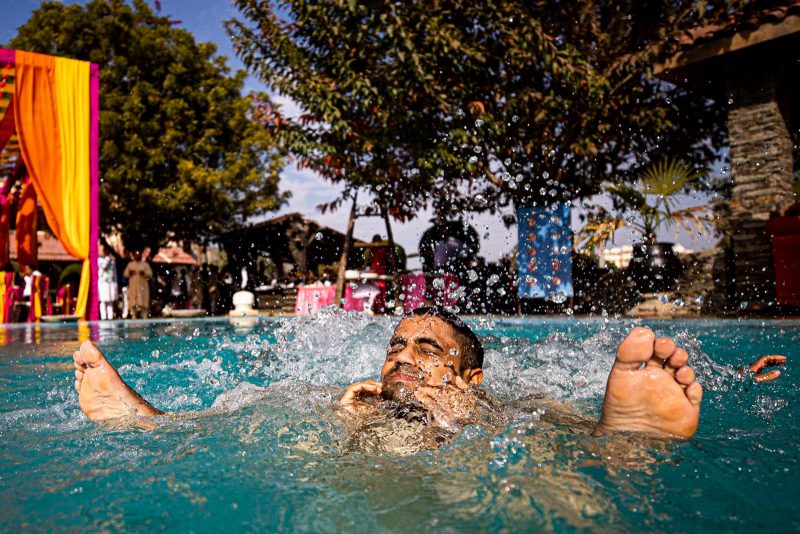
Alan Law:
Especially the first way around of like, what’s something that you love that most people seem to hate that that stumbles people, but sometimes people can think of something that they hate, that people, other people seem to love. Like some people hate Marmite. So have you ever had marmite?
Prasheila Lookhar:
I don’t know what marmites are.
Alan Law:
It’s kind of this kind of yeast extract paste that they sell in the UK and people either love it or hate it or whatnot. I love Dawson’s Creek. Have you ever seen Dawson’s Creek, the TV programme?
Prasheila Lookhar:
I have not. No, not really.
Alan Law:
You need to watch that. It’s very old now, but I love that. And a lot of people seem to hate that. But anyway, let’s drop that question. Let’s go.
Prasheila Lookhar:
Yeah. Let’s move to the next one.
Alan Law:
Okay. Have you ever met or photographed anyone famous?
Prasheila Lookhar:
Yes.
Alan Law:
Okay. Just yes.
Prasheila Lookhar:
Yes. So it was, you know, that 2000 people wedding that we spoke about earlier that was the daughter of somebody who is very high up in the healthcare industry in India. So there were a lot of, you know, politicians, a lot of business people. I remember a famous musician family being there as well, so yeah,
Alan Law:
It’s mad. Isn’t it? What we do get to just see and experience.
Prasheila Lookhar:
Oh, I know. It’s amazing.
Alan Law:
Yeah. Are you missing it now? You’re missing it?
Prasheila Lookhar:
Not so much because I think I’m so clear as to why I’m not doing it that I am not missing it so much. No. Oh, sorry. I just remembered. At the hockey India league. Right? Because I was in the VIP lounge. I did meet some very, you know, famous people there. Yeah.
Alan Law:
Oh, cool. Is that? Do you ever get like star struck at all or are you just cool?
Prasheila Lookhar:
I think during a shoot, I do not. I think otherwise I really wouldn’t know what to say.
Alan Law:
Yeah. It’s funny. Isn’t it? It’s funny. It’s funny. Has there been a specific turning point in your career, you know, something perhaps a certain wedding or a certain award or anything that’s had an impact on your career?
Prasheila Lookhar:
Yes. Yes, for sure. So for very long time, they weren’t any conferences that photography, wedding photography conferences that were happening in India and in 2016 we had something called the Silk conference and that’s where I came first met Rocio as well. Yeah. So Rocio was there, Susanna Barbara was there, Erika and Lanny were there, Franck was there, Christophe and I’m sure if you names I’m forgetting right now. But soon after I definitely saw a huge change in my photography.
Alan Law:
Oh, okay. That’s cool. Was that a multi-day event or it was a one day event?
Prasheila Lookhar:
It was multi day. Yeah.
Alan Law:
Very cool. That’s I love going to conferences as well. It’s great. Just to meet other photographers, isn’t it, obviously you learn from the talks, but just meeting and spending that time with them is just lovely.
Prasheila Lookhar:
It is. It really is. Yes. And you know, you also understand that you’re not alone in a lot of the struggles that you’re facing in the business and in photography and that’s what gives you solace. Right?
Alan Law:
It’s so true.
Prasheila Lookhar:
You sometimes think you’re the only one.
Alan Law:
Yeah. It’s so true though. Isn’t it? It’s so true. Because it can, yeah, it can be a very kind of insular lonely job. It can be if you don’t yourself out there. Yeah. As you say to know that people are going through the same things, that’s a big deal.
Prasheila Lookhar:
Yeah. Yeah. It just makes it a little easier. And also, you know, you meeting people is always fun. Isn’t it?
Alan Law:
That’s true. Yeah, it’s most of the time, 99% of the time.
Prasheila Lookhar:
It was fun meeting you for sure.
Alan Law:
It was really fun. Yeah. I loved that. That was great. That was really cool. What’s more important to you: composition, lights or moment?
Prasheila Lookhar:
Moment. Without a doubt.
Alan Law:
Yeah. Cool. Yeah, I agree. I agree. It is interesting though, isn’t it? Cause a lot of the time people say those three things as kind of like, they’re all weighted the same, but they’re not, are they?
Prasheila Lookhar:
No, they aren’t. Not for me, at least. I’m sure there are people for whom light and composition more mportant and that’s, that’s absolutely all right. Yes. But I think for me it’ll always be moment.
Alan Law:
That’s cool. Cool. Totally agree. Totally agree. But as you say, there’s no right or wrong
Prasheila Lookhar:
This is Reportage. Right? We’re talking about This is Reportage. Moment is always important.
Alan Law:
Exactly. Can we talk regarding your editing specifically? Can you tell us a bit maybe about how you do yours, any bits of tips of advice, you know, it could be to do with like workflow or, you know, do you use any kind of like keyboard shortcut systems or, you know, any of those board things? What do you think? How do you do yours?
Prasheila Lookhar:
Tips, I think it’s always just important to get the most out of a photo. I am not against excessive editing in terms of dodging/burning. I don’t necessarily remove, I don’t do any kind of digital manipulation. But you know, we have certain tools at our disposal. Most people do shoot raw, which gives you a certain capability, you know, while you’re at the edit table. And even if you’re not using Photoshop, I mean, I don’t use Photoshop at all actually. I must’ve used it for all of five photos in the last whatever many years and just Lightroom is such a strong software. And, you know, you just need to really understand it and understand its capabilities and learning it, it’s such an easy software to learn. Nobody taught me how to edit. It’s just something that I picked up, you know, and every time I had a problem, I would just Google it and figure out how to do it. It’s such an easy software to get a handle of.
Alan Law:
It is intuitive isn’t it. And you do all your editing or do you both like edit your own shots or how do you do that?
Prasheila Lookhar:
We actually do outsource quite a bit of it because we travel a lot and for us deliveries are important. So we do outsource it. And as soon as the catalogues come back, obviously we will sit and go through it to make sure you know, that everything is up to our standards. And we definitely usually do make a little bit of adjustments here and there.
Alan Law:
Yeah, I get that. That’s cool. I mean, outsourcing I think it’s great if, you know, when it works for you. I tried it a few years ago and my initial weddings that were coming back were really good. And then, and then it kind of went downhill, so I kind of stopped doing it, but again, it comes back to that, you know, you need time to enjoy life. Yeah, exactly. Yeah. All that matters is that the overall product that you’re giving to your clients is great, which, you know, it’s going to be. So, yeah. I totally agree.
Prasheila Lookhar:
I agree. We actually work with a great post production company, so.
Alan Law:
Oh, that’s cool. Yeah. Good stuff. I think that’s great. I need to find someone really good Maybe. There’s so many different ones out there though, aren’t there. Yeah.
Prasheila Lookhar:
Yeah. I’ll give you a coupon code for it. I think you’ll get a 20% off on your first order.
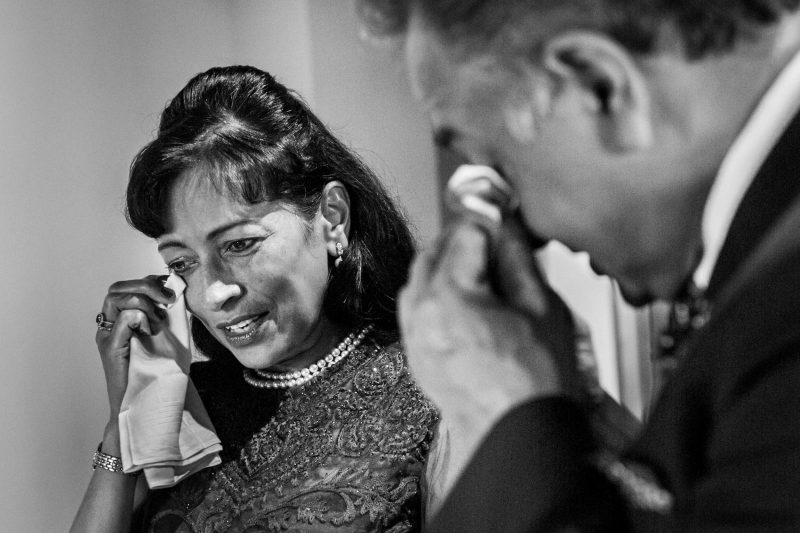
Alan Law:
That’s good.
Prasheila Lookhar:
But to anybody listening it is, Wait, let me look that up. It’s called Oodio.
Alan Law:
Oh, cool. Yes. I think I spoke to Steve Gerrard in Canada and he uses them and really recommended them as well, actually.
Prasheila Lookhar:
Yeah? Yeah. The coupon code, you know what? Maybe I’ll send it to you later. I think it’s GBP 2020. But maybe you can put that in the introduction. (edit: it’s actually OodioGBP2020)
Alan Law:
Yeah. I put it in the post as well, in the transcript and the posts on the site. So if you head to thisisreportage.com. Cool. Do you have a favourite lens or favourite focal length at all?
Prasheila Lookhar:
I do shoot a lot with the 16-35 and the 35.
Alan Law:
Okay, cool. Cool. Yeah. And do you take loads of different lenses on a day to a wedding or do you just kind of generally just use those kind of couple lenses? How do you work?
Prasheila Lookhar:
No, not too many. I think the most I would do is shift the, both of us actually, both Abhimany and I do shoot with two bodies each. Right. So yeah, so it’s either, we definitely, both of us definitely have the 16-35 because we love to be in the action. Whether it’s, you know, the dance floor or the wedding, or even the pool parties, you know, like both of us will be in the pool, like, okay. Not both of us, one of us really. Right. Definitely. Yeah. We will, if there are people in the pool, one of us will be inside the pool with them. That’s the only way to be able to get some really crazy, amazing photos. Right?
Alan Law:
So you’re not worried about… do you have a water casing or anything or…
Prasheila Lookhar:
No, no, no. But you know they’re all water sealed, the camera’s all weather sealed, Right? We use Canon and it’s not, we haven’t had a problem till now, so. Touch wood. Touch wood.
Alan Law:
Oh yeah. Have you got your wooden iPhone case?
Prasheila Lookhar:
I do. Yeah. Good idea. Do you want to tell people what the story behind that is?
Alan Law:
Yeah. I mean, I touch wood all the time and my wife got me a wooden iPhone case, which I showed to you. Didn’t I, when you came down here? Yeah.
Prasheila Lookhar:
Yes.
Alan Law:
It’s really good to have wood on you all the time that you can just touch.
Prasheila Lookhar:
Exactly. I agree. And you know, when Alan, you told me that I looked it up and now I have one for my phone as well.
Alan Law:
So cool. I love that. You inspired me with the book and then I gave you the wood and the iPhone idea. Yeah.
Prasheila Lookhar:
Practical idea as well. So I liked it.
Alan Law:
Can you tell me something that you’re truly awful at?
Prasheila Lookhar:
Oh, in photography or generally, right?
Alan Law:
Anything, anything that comes to your mind?
Prasheila Lookhar:
Confrontation.
Alan Law:
Yeah. Oh really? Yeah. Oh, okay.
Prasheila Lookhar:
Try to avoid it, but I’m bad at avoiding it as well so they’re generally a lot of tears involved.
Alan Law:
That doesn’t sound good. Awful at confrontation, but awful at avoiding confrontation. That doesn’t go hand in hand very well.
Prasheila Lookhar:
I mean, I’m laughing about it now, but it’s not funny at all. Is it though?
Alan Law:
Oh, I guess it’s not. No. Okay. Okay. Let’s go. Let’s change again. What inspires you in life? Very grand question, I guess, but what inspires you?
Prasheila Lookhar:
Like I said earlier, right? We had that talk about every single person you meet. So I actually truly believe that even if it’s somebody I do not like, I am able to, you know, see at least one or two things to get inspired by. And books, books inspire me so much. I read a lot of books. I think I’m currently reading five different books.
Alan Law:
Really? What concurrently?
Prasheila Lookhar:
Yeah, yeah, yeah, yeah. At the same time, because every book is going to be different, you know, of one might be a self-help, one might be an autobiography. So like right now I am doing the Artist’s way. I don’t know if you’ve heard of it. It’s basically, you know, a creative writing. It’s sort of like a creative, not creative writing. Sorry. It’s a course on it’s a 12 week course on creativity. It’s actually very interesting. You should definitely it out. I’m reading Michelle Obama’s autobiography.
Alan Law:
Oh, cool. My wife read that recently. She said that was great.
Prasheila Lookhar:
Yeah. It is a really good book. I’m reading something on mental toughness. Okay. And that’ll help me with the confrontation sometime. I’m sure.
Alan Law:
Yeah. Oh yeah.
Prasheila Lookhar:
So books definitely, like lots of books. And I also read a lot of fantasy as well. So dragons are my favourite.
Alan Law:
Oh really? Okay, cool. You’re a Harry Potter fan, aren’t you? I think
Prasheila Lookhar:
Yes I am. But you know, do you know what the controversy that’s been happening with J. K. Rowling, some of the things that she has tweeted about?
Alan Law:
Yes I have. Yeah.
Prasheila Lookhar:
So I’m sort of like, not so happy about liking Harry Potter anymore.
Alan Law:
Oh yeah. I understand. It’s difficult, isn’t it?
Prasheila Lookhar:
Yeah. Yeah. Because you love the work, but then the author comes on and says something that’s so mean, for lack of a better word right now. You just, you know, it gets quite conflicting as a fan. Yeah. But yeah. Yeah. But yeah, at one point they were my favourite books for sure. Yes.
Alan Law:
Oh, okay. But yeah. Soured it a bit for you at the moment. Yeah. I I’m enjoying reading it so I don’t read as much as you are, but I am enjoying it just in the evening as a way to just because I work so much, I must need a bit of downtime before bed and not being on my phone, I think as well. I’m reading a book by Darren Brown on happiness and about Stoicism, which is really, really interesting.
Prasheila Lookhar:
Oh yeah, yeah, yeah. Marcus, what is the name of the emperor? Marcus Aurelius?
Alan Law:
Oh yes. Yeah. He does talk about him. Yeah,
Prasheila Lookhar:
Yeah. I got a book on pragmatism and stoicism as well. So maybe once I finish reading all the ones that I am on. Yes.
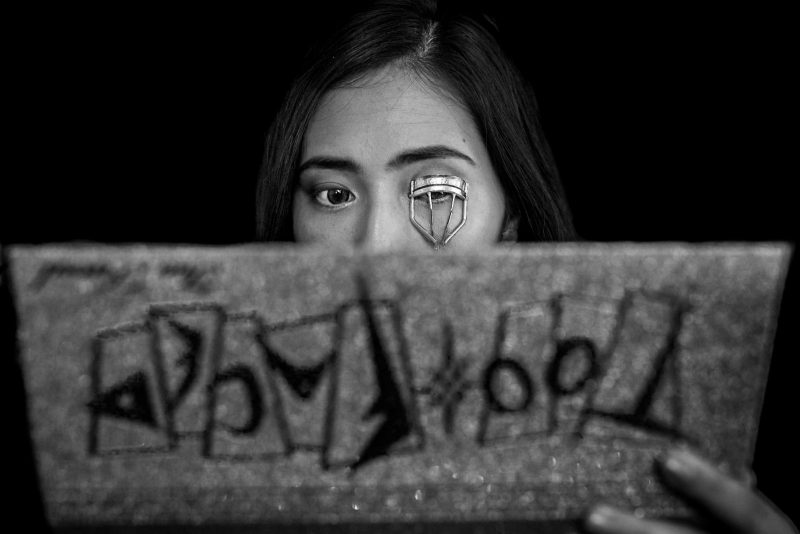
Alan Law:
Yeah. I can recommend that. After your five books. That’s funny. Okay. What in your opinion, another big kind of question, but what in your opinion makes a good wedding photographer? Big one.
Prasheila Lookhar:
Yeah. It is really big because it’s not just one thing. Right. It’s just so many, but I think the biggest thing would be empathy, especially if you want to be a documentary photographer. Yeah. I think empathy would go a long way in you relating to the people and in turn to the photos that you take.
Alan Law:
Do you think, I totally agree with you there. Do you think empathy is something that you can, you know, that you’re just born with or is there things you can do to make you become more empathetic? You know, what’s your opinion on that?
Prasheila Lookhar:
I think you can develop it for sure. Because I do know that as a kid, I don’t think I had even a little bit of ounce of empathy. Yeah, I’m not kidding. But you know, life experiences, I think I have developed it more in the last say 10 years or so. Yeah. Definitely. It’s something you can definitely develop, but I don’t know if I don’t think I’ve done anything consciously to develop it.
Alan Law:
It kind of happens through life.
Prasheila Lookhar:
Yeah. It just happened. I think you just need to be open to the idea of changing because if you aren’t, then even if you have some really big life experiences, it might not teach you empathy.
Alan Law:
That’s true. That openness is a big deal, isn’t it? Yeah. It’s true.
Prasheila Lookhar:
Yeah. And also I think more than just openness, openness to the idea that you could be wrong.
Alan Law:
Hmm. That’s true. Which a lot of people don’t think about. Yeah. That’s true. I think I’m the opposite and I think I’m wrong all the time.
Prasheila Lookhar:
I know what you mean because I go through that a lot too,
Alan Law:
I guess. I don’t know. Not just, confidence in life is just something it’s just so interesting and important. And I, you know, I go on kind of like coasters sometimes I’ll feel good and sometimes I guess that’s normal though. Isn’t it?
Prasheila Lookhar:
Probably right? I mean, I don’t know. Maybe it’s not the same for other people. If you can comment and let us know. Yeah.
Alan Law:
Prasheila I think we’ve got time just for one more question. Thanks so much for this. I really enjoy talking to you. It’s so cool. So, okay. Last question. Do you eat the canapes?
Prasheila Lookhar:
Oh, you don’t have canapes at Indian weddings. I don’t eat them.
Alan Law:
It’s a great way to end it.
Prasheila Lookhar:
I don’t even know what that is, so I’m assuming it’s not there at Indian weddings.
Alan Law:
No, maybe that’s not. Yeah. It’s just like those little kind of finger food things that they like give you like during the cocktails type bit.
Prasheila Lookhar:
Oh yeah, definitely. Yeah. Yeah. But you don’t have a specific, just so you know, you don’t have, you know, like specific like cocktail hours inbetween the wedding and the reception in India, because the days are just laid out so differently. Right. The event is so different from what your usual weddings in the West are. Yeah.
Alan Law:
That’s, what’s so cool again, isn’t it about what we do in all these different kind of ways and so many things. I love it. It’s just great. Prasheila thank you so much. I really enjoyed that.
Prasheila Lookhar:
Thank you Al. I’m so glad that you asked me to do this because I mean, I had so much fun with you in Truro and you know, and I’m glad that we were able to catch up.
Alan Law:
Yeah. It’s been lovely. Really. It feels like it was this last week, you know?
Prasheila Lookhar:
Yeah.
Alan Law:
And now we’re like thousands of miles apart, but it doesn’t feel like that. It’s cool.
Prasheila Lookhar:
Yeah I can’t wait to cut my own pizza again.
Alan Law:
Oh, thank you so much. You were great. So just open and honest and just great bits of information There. It’s awesome. Anyone who’s listening now whiles running or cycling, do head to the site thisisreportage.com and I’ll include lots of examples of Prasheila’s work and link to her website as well. And yeah hopefully we’ll get to cut pizza again together soon.
Prasheila Lookhar:
Yes, yes. Thank you so much, Alan. Thank you.
Alan Law:
Thank you. Thank you for talking to me and stay safe and yeah, I’ll be in touch.
Prasheila Lookhar:
You too. You too.
Alan Law:
Bye bye.
Prasheila Lookhar:
Take care. Bye.
***********************************************************
We hope you enjoyed our Prasheila Lookhar interview!
View lots more of her work on her website, or here on her TiR profile.
Interested in joining us? Click over here to see all the benefits and apply to join us.
